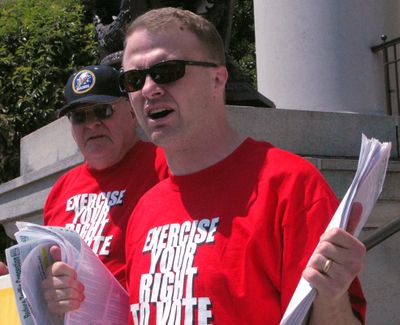State Supreme Court rules against Tim Eyman in ‘cap-and-trade’ case

OLYMPIA – Tim Eyman, a frequent sponsor of anti-tax ballot measures, lost his most recent court battle on Friday when the state Supreme Court dismissed his case to put “cap-and-trade” legislation from 2021 on the November ballot.
Eyman filed a lawsuit in Thurston County Superior Court to allow the legislation, which will generate some money for the state beginning next year, to appear on the ballot as a tax advisory vote, a nonbinding measure that allows voters to weigh in on taxes passed in the Legislature.
The state Supreme Court found it was untimely to put the measure on the ballot this year because it passed in 2021.
A Thurston County judge was expected to hear arguments on the case Friday after issuing a temporary restraining order prohibiting the secretary of state from printing voters’ pamphlets without the advisory vote.
Attorney General Bob Ferguson and Secretary of State Steve Hobbs went to the state Supreme Court for emergency review, claiming Eyman’s ask is untimely as the legislation passed in 2021.
The state Supreme Court agreed.
“The superior court erred in determining that respondent’s action is timely,” Chief Justice Steven González wrote in his decision.
State law says a measure raising taxes should be placed on “the next general election ballot” to ensure a timely vote occurring in the year the measure passed, according to the order.
Eyman did not challenge the attorney general’s failure to put the legislation on the 2021 ballot, and challenging it this year now makes it untimely, the court found.
In his order, González said neither Eyman nor anyone else challenged the decision to not put the vote on November 2021 ballot.
“Though the measure was amended in 2022, those amendments do not affect the provisions respondent contends constitute a tax in order to provide a basis for now submitting the measure to an advisory vote,” the order reads.
The new law sets a cap on emissions that large polluters in Washington have to meet by 2023. Those who fail to meet the cap would have to purchase allowances from the state.
The revenue from the allowances will go toward the state, which will use it to pay for new transportation programs and programs that improve the environment and help those disproportionately affected by climate change.
Eyman claims Ferguson’s failure to put the advisory vote on this year’s ballot was “hiding it from the public.”